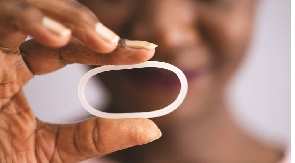 A woman holds a diaphragm of a vaginal contraceptive ring
A woman holds a diaphragm of a vaginal contraceptive ring
A "revolutionary" vaginal ring to prevent HIV is soon to be rolled out in South Africa -- which has the largest epidemic of the virus in the world, a global financing partnership said on Friday.
The Global Fund to Fight AIDS, Tuberculosis and Malaria said three groups involved in the fight against AIDS in the country have, with its support, placed an initial order of 16,000 rings -- that are expected to become available in the coming months.
"We are convinced that this new (pre-exposure prophylaxis) ring can have a revolutionary impact on HIV prevention," said Global Fund executive director Peter Sands.
The silicone ring, which is worn constantly and replaced monthly, releases dapivirine, an antiretroviral drug.
The initial rollout will serve as a first step to increase access to treatment and make the rings readily available in a country where almost 8 million people live with HIV, according to the Global Fund.
Anti-retroviral drugs help contain the virus and prevent it from infecting others and have been key in curbing the spread of AIDS over the past couple of decades.
But pre-exposure prophylaxis usually entails taking a daily pill or receiving a monthly jab -- methods that do not suit everyone, AIDS charities say.
Some might struggle to remember to take their pills or prefer something more discreet given the HIV-related stigma, says the Global Fund, which brings together governments, multilateral agencies, private and civil society groups.
"Women need access to a range of safe and effective options to choose from, including the dapivirine ring, so they can decide to use what works best for them," said Ntombenhle Mkhize, CEO of the AIDS Foundation of South Africa.
HIV has a long and tragic history in South Africa.
Through a tragic combination of cost and political denial, life-saving drugs that came onstream at the end of the 1990s were not available to poor South Africans and several hundred thousand AIDS-sufferers died, according to one estimate.
Today, fatalities have plummeted, but new infections are still high.
Recent studies have shown that the ring, which has been endorsed by the World Health Organization, is safe, easy to wear and significantly reduces the risk of infection.
This year, women and girls have accounted for 53 percent of all HIV infections globally, according to UNAIDS.
Women are disproportionately affected by HIV in South Africa, accounting for 64 percent of the 7.4 million adults living with the virus in the country.
."We hope that many more countries will follow South Africa's move," said Sands.
The ring has been approved and subjected to implementation studies in a number of countries across the continent, including Uganda, Kenya and Zimbabwe.